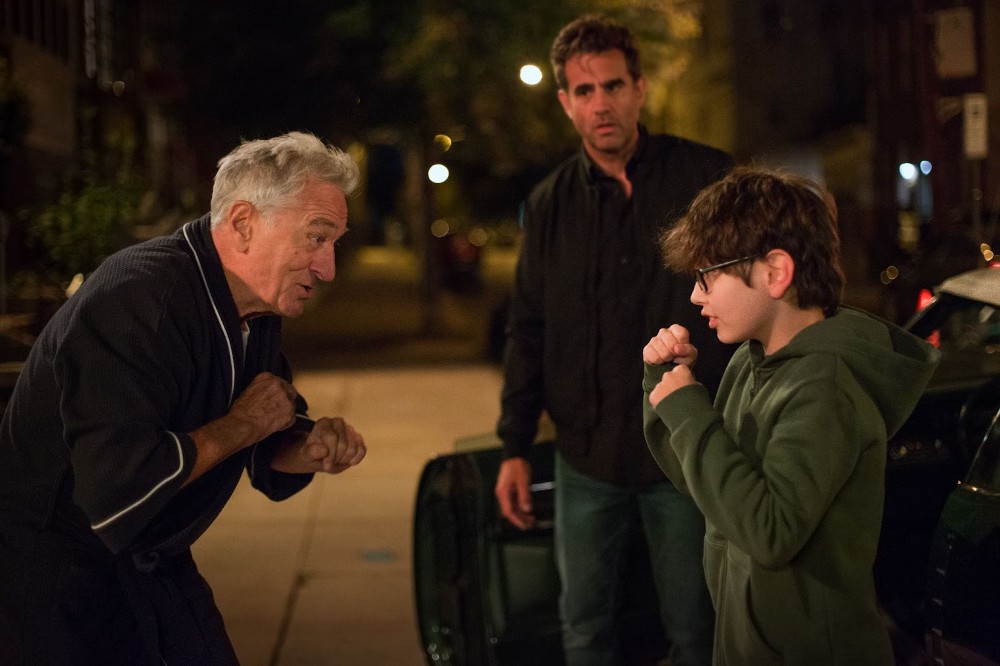
Father-son or daughter themes have pervaded at this year’s Toronto International Film Festival. Few seem as honest and surprising as Ezra, a film starring Bobby Cannavale and Robert De Niro. The core of the story is the cross-country trip by Bobby’s character with his 10-year-old son, the titular Ezra, who is autistic, kicked out of public school, and on the verge of being put on serious medication. But the dramedy is about something more transcendental—that we can somehow rise above our own mistakes and those of our fathers.
The result is not cinematically groundbreaking or tremendously original, but the story has such conviction and empathy that it becomes one of the most persuasive of the many that touched these themes this festival season. It should have far-reaching audience appeal.
Cannavale plays Max Brandel, a middle-aged standup comic whose life is in serious shambles mostly due to the difficulties of raising an autistic child (played by newcomer William Fitzgerald). Max uses Ezra’s autism as a punchline during some of his standup routines, much to the charging of his manager, played by an underused Whoopi Goldberg. His estranged wife, a mostly bubbly Rose Byrne, is Ezra’s loving mother, together with her new boyfriend, played by Tony Goldwyn, who is also behind the directorial helm. Last but certainly not least, De Niro plays Stan, Max’s own father. As you may expect, he plays a man’s man, an aging working-class cantankerous hero who mostly calls it like he sees it but is unable to express physical or other emotion. Rainn Wilson shows up in the middle act as Max’s wacky, pot-smoking, hermit-like brother.
There is an intergenerational story somewhere in between Ezra’s heartfelt jokes and its somewhat sloppy emotional fluff, courtesy of Tony Spiridakis’ script. In a pivotal scene towards the third act, Stan explains to Max the importance of the sacrifices a father can make for his son, his story laced with sincere regret about his own failure to do so. The scene embodies not just the emotional core of the movie, but a subtle yet important statement about how conceptions of fatherhood have changed and are changing. And it signifies, more than anything, our ability to raise above the challenges thrown at us from different ages and corners. It is difficult but uplifting in its simple sincerity. The point of all of this is that they did the best they could with the tools they were given and within the bounds of societal expectations about fatherhood.
Beyond that, who knows if Ezra’s inability to express physical emotion is supposed to portend a return to Stan’s generation’s colder approach? Maybe the movie is saying that just as Stan could not touch his son, Ezra cannot let his father touch him. It is an emotionally difficult situation for Max to be caught in, given his more Gen X emotional sensibilities. That none of these messages are spoken but can be heartfelt in between the wacky family moments, the screams and the tears, makes this a script that creeps up on you quite unexpectedly, like a good comedian landing a refreshing punch line.
As for Below the Line, cinematographer Danny Moder does a fine job of lighting Cannavale well when he’s on the standup stage, giving him an aura of a faded, jaded god fallen from grace. Most of the action is in the script and acting, though, where Ezra quietly excels.
Byrne and Cannavale have a soft chemistry as the parents struggling to do their best. Both actors give it their all, though the action is almost entirely focused on Cannavale, who allows himself to be rugged, disheveled, and beaten down for the first time in a long time. Not all the jokes land—just like Max’s comedic routines do not—but everyone gives it their mightiest.
Maybe because of the incredible sincerity of Cannavale’s sad eyes, or the emotional and physical performance by the young star. Maybe because of the quirks, or because it has the most sympathetic characters. Whatever the reason, this movie succeeds in convincing you that these familiar themes are worth exploring where others failed, and for that reason alone is worth the watch as an unequivocal crowd-pleaser.
Grade: B
Ezra Premiered at the Toronto International Film Festival on September 9 and is looking for theatrical distribution.
Twitter: @jdonbirnam
Instagram: @awards_predix





